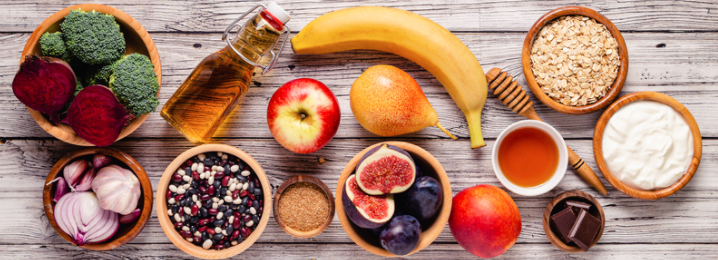Most of us have heard the term “gut health” and know that keeping it in good standing is desirable. Although you may not give your gut much thought beyond how your body processes food, your gut is home to microbes and bacteria that play a crucial role in your overall well-being, from boosting immunity to reducing inflammation and even balancing your mood. But how can it affect so many aspects of our health? And how does gut health impact our weight?
With La Maison Medicale, we answer these questions and discuss the steps we can take to maintain a good gut health and limit weight gain.
What is meant by Microbiome?
Essentially, gut microbiome refers specifically to the microorganisms living in our intestines. Scientists estimate that roughly 100,000 billion microbes live in our digestive tract (this is 5,000 times the world population!). While some microorganisms are harmful to our health, many are incredibly beneficial and even necessary to a healthy body.
Every gut microbiome is unique: the type of bacteria varies significantly from one individual to another.
The microbiome is acquired at birth and evolves continuously as we age. Babies get exposure to microbes at birth, while traveling through the birth canal, and pick up more while breastfeeding. Breast milk doesn’t feed just the baby, it also feeds the baby’s microbiome. It contains the nutrients a baby needs, as well as the right bacteria. These bacteria jump start the baby’s immune and digestive systems, and even shape brain development.
Worth noting that these microbes altogether weigh 1 to 2 kg, which is roughly the weight of your brain!
Why should I listen to my gut health?
Here is the bad news: the convenience of our modern lifestyle often comes with a heavy toll on our health. High stress levels at work or in school, too little sleep, a nutrition based mostly on processed and industrialized food, can damage the human microbiota. The tendency to frequently consume antibiotics further contributes to damaging the intestinal flora. They destroy both dangerous bacteria and good bacteria contained in the human microbiota. An unstable microbiota is synonymous with diseases down the road, from obesity to anxiety.
Microbiome and obesity
- The gut microbiome directly affects digestion and the production of chemicals that give you a feeling of hunger and satiety. Microbes and bacteria in the digestive tract alter the way we store fat, and how we balance levels of glucose in the blood. Therefore, Gut bacteria and weight are intrinsically linked.
- According to a 2020 CDC (Centers for Disease Control and Prevention) study, an estimated 500 million adults in the world are obese. Obesity is a medical condition characterized by having too much body fat (Body Mass Index (BMI) of 30 or higher).
- The process of fat tissue accumulation is as follows. When we consume highly processed foods or unhealthy fats, our body reacts with high levels of inflammation that encourage the growth of certain “bad” bacteria in the gut. These bad bacteria can overwhelm the “good” bacteria and trigger an overproduction of insulin, which will cue your body to start storing fat. You will lack the bacteria that process healthier food.
- When you have an imbalance between the good (helpful) and bad (potentially harmful) bacteria in your digestive system (i.e. gut dysbiosis), you are more likely to gain weight.
- In turn, the wrong mix of microbes can help set the stage for obesity and diabetes. Studies have shown that lean individuals tend to have a wider variety of bacteria that specialize in breaking down fibers that the body can later use as a source of energy.
No worries, let’s listen to your gut!
But don’t worry, MeditSimple has your back! Learning how to reshape your microbiome will help you manage a weight gain and live a healthier life.
How to keep your microbiome in good shape?
When it comes to weight gain, part of the explanation lies in the food we eat. Diet plays a crucial role in shaping the gut ecosystem. You must know people who struggle to lose weight despite following sensible advice. The reason for this is that the microbiome is as individual as we are. No wonder then that one diet does not suit all! You need a personalised treatment plan based on the analysis of your microbiota.
In order to reset your metabolism and stimulate healthy bacterial growth, you first need to get an analysis of your microbiome. La Maison Medicale and its experts in gastroenterology offer 3 different packages that evaluate your gut health. They all include a questionnaire, medical consultation, and stool analysis. The results are delivered in a comprehensive medical report, followed by another consultation to discuss prescriptions and personalised micronutrition advices.
Book an appointment with one of their Health Professionals today!
Their objective is to cultivate this intestinal ecosystem in ways that could prevent and possibly treat overweight.
Their treatment plan is carefully tailored to every patient’s needs. They use a combination of foods and prebiotic-probiotic complements.
 Prebiotics are a type of fiber on which useful microbes can thrive. Foods rich in prebiotic include artichokes, bananas, asparagus, oats and apples.
Prebiotics are a type of fiber on which useful microbes can thrive. Foods rich in prebiotic include artichokes, bananas, asparagus, oats and apples.
Probiotics are live bacteria such as the Lactobacillus specie that “reseed” your gut with healthy microbes.
Yet, there is no absolute certainty that the microbes contained in probiotics will colonise your gut when they get there, or if they will offer benefits to already healthy people, such as preventing diseases. As a rule of thumb, better choosing your food is the most efficient way to restore the composition of the gut microbiome.
There are many other ways to boost your gut health that can be easily incorporated into your daily routine. Eating a diverse range of foods and limiting your intake of high-sugar foods generally leads to a diverse microbiome (indicator of good gut health). For instance, a plant-based diet can tweak the microbiome and reduce inflammation and cholesterol. Fermented foods (yogurt, sauerkraut) and whole grains contain lots of fiber, which reduces the risk of overweight, diabetes and other disorders.
What next?
Your gut microbiome is the foundation of your health. Depending on the strain, you can make these bacteria a friend or foe to your body. Learn how to preserve it, and explore our Centre of Excellence for gastroenterology today!
Centre of Excellence for Gastroenterology
Sources
Atlas Biomed- What’s Going On With Gut Bacteria And Weight Gain?
Healthline- How Your Gut Bacteria Can Influence Your Weight
Healthline- Why the Gut Microbiome Is Crucial for Your Health
Scientific American- How Gut Bacteria Help Make Us Fat and Thin






